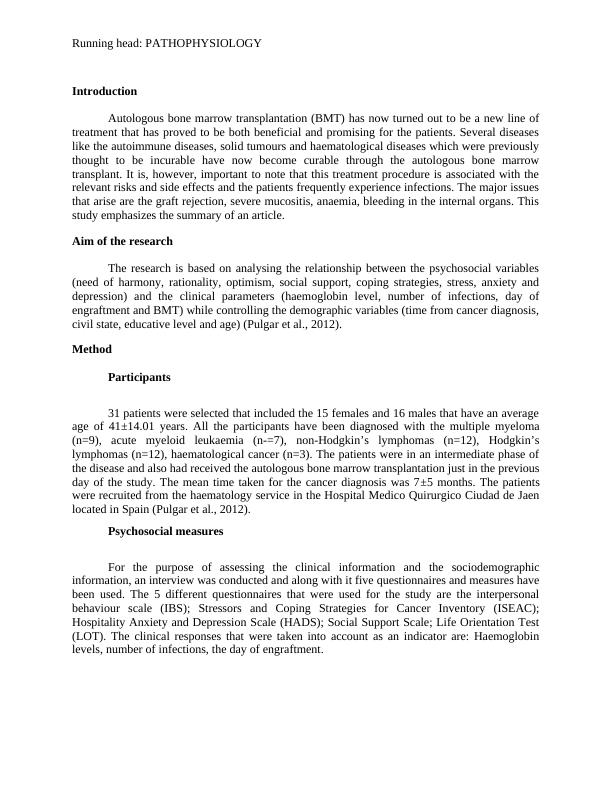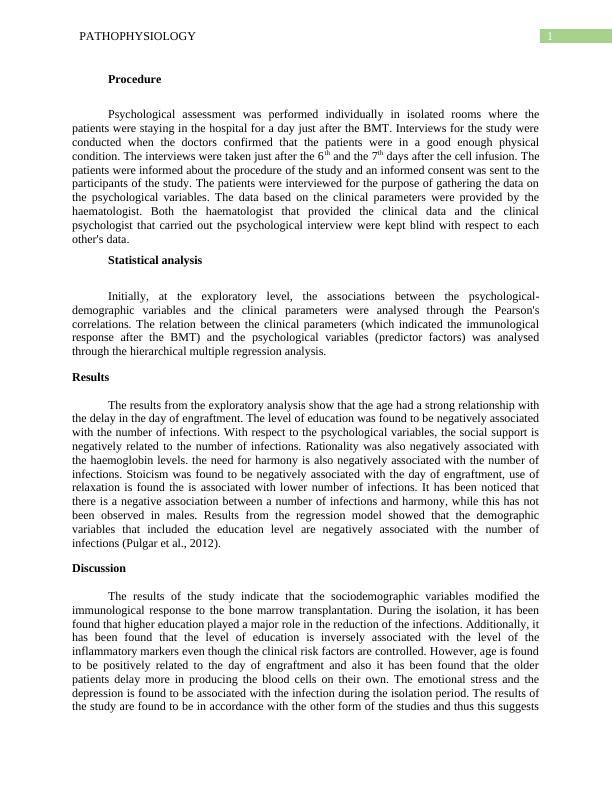Psychosocial Predictors of Immune Response Following Bone Marrow Transplantation
Added on 2023-06-11
4 Pages1197 Words248 Views
Running head: PATHOPHYSIOLOGY
Introduction
Autologous bone marrow transplantation (BMT) has now turned out to be a new line of
treatment that has proved to be both beneficial and promising for the patients. Several diseases
like the autoimmune diseases, solid tumours and haematological diseases which were previously
thought to be incurable have now become curable through the autologous bone marrow
transplant. It is, however, important to note that this treatment procedure is associated with the
relevant risks and side effects and the patients frequently experience infections. The major issues
that arise are the graft rejection, severe mucositis, anaemia, bleeding in the internal organs. This
study emphasizes the summary of an article.
Aim of the research
The research is based on analysing the relationship between the psychosocial variables
(need of harmony, rationality, optimism, social support, coping strategies, stress, anxiety and
depression) and the clinical parameters (haemoglobin level, number of infections, day of
engraftment and BMT) while controlling the demographic variables (time from cancer diagnosis,
civil state, educative level and age) (Pulgar et al., 2012).
Method
Participants
31 patients were selected that included the 15 females and 16 males that have an average
age of 41±14.01 years. All the participants have been diagnosed with the multiple myeloma
(n=9), acute myeloid leukaemia (n-=7), non-Hodgkin’s lymphomas (n=12), Hodgkin’s
lymphomas (n=12), haematological cancer (n=3). The patients were in an intermediate phase of
the disease and also had received the autologous bone marrow transplantation just in the previous
day of the study. The mean time taken for the cancer diagnosis was 7±5 months. The patients
were recruited from the haematology service in the Hospital Medico Quirurgico Ciudad de Jaen
located in Spain (Pulgar et al., 2012).
Psychosocial measures
For the purpose of assessing the clinical information and the sociodemographic
information, an interview was conducted and along with it five questionnaires and measures have
been used. The 5 different questionnaires that were used for the study are the interpersonal
behaviour scale (IBS); Stressors and Coping Strategies for Cancer Inventory (ISEAC);
Hospitality Anxiety and Depression Scale (HADS); Social Support Scale; Life Orientation Test
(LOT). The clinical responses that were taken into account as an indicator are: Haemoglobin
levels, number of infections, the day of engraftment.
Introduction
Autologous bone marrow transplantation (BMT) has now turned out to be a new line of
treatment that has proved to be both beneficial and promising for the patients. Several diseases
like the autoimmune diseases, solid tumours and haematological diseases which were previously
thought to be incurable have now become curable through the autologous bone marrow
transplant. It is, however, important to note that this treatment procedure is associated with the
relevant risks and side effects and the patients frequently experience infections. The major issues
that arise are the graft rejection, severe mucositis, anaemia, bleeding in the internal organs. This
study emphasizes the summary of an article.
Aim of the research
The research is based on analysing the relationship between the psychosocial variables
(need of harmony, rationality, optimism, social support, coping strategies, stress, anxiety and
depression) and the clinical parameters (haemoglobin level, number of infections, day of
engraftment and BMT) while controlling the demographic variables (time from cancer diagnosis,
civil state, educative level and age) (Pulgar et al., 2012).
Method
Participants
31 patients were selected that included the 15 females and 16 males that have an average
age of 41±14.01 years. All the participants have been diagnosed with the multiple myeloma
(n=9), acute myeloid leukaemia (n-=7), non-Hodgkin’s lymphomas (n=12), Hodgkin’s
lymphomas (n=12), haematological cancer (n=3). The patients were in an intermediate phase of
the disease and also had received the autologous bone marrow transplantation just in the previous
day of the study. The mean time taken for the cancer diagnosis was 7±5 months. The patients
were recruited from the haematology service in the Hospital Medico Quirurgico Ciudad de Jaen
located in Spain (Pulgar et al., 2012).
Psychosocial measures
For the purpose of assessing the clinical information and the sociodemographic
information, an interview was conducted and along with it five questionnaires and measures have
been used. The 5 different questionnaires that were used for the study are the interpersonal
behaviour scale (IBS); Stressors and Coping Strategies for Cancer Inventory (ISEAC);
Hospitality Anxiety and Depression Scale (HADS); Social Support Scale; Life Orientation Test
(LOT). The clinical responses that were taken into account as an indicator are: Haemoglobin
levels, number of infections, the day of engraftment.

1PATHOPHYSIOLOGY
Procedure
Psychological assessment was performed individually in isolated rooms where the
patients were staying in the hospital for a day just after the BMT. Interviews for the study were
conducted when the doctors confirmed that the patients were in a good enough physical
condition. The interviews were taken just after the 6th and the 7th days after the cell infusion. The
patients were informed about the procedure of the study and an informed consent was sent to the
participants of the study. The patients were interviewed for the purpose of gathering the data on
the psychological variables. The data based on the clinical parameters were provided by the
haematologist. Both the haematologist that provided the clinical data and the clinical
psychologist that carried out the psychological interview were kept blind with respect to each
other's data.
Statistical analysis
Initially, at the exploratory level, the associations between the psychological-
demographic variables and the clinical parameters were analysed through the Pearson's
correlations. The relation between the clinical parameters (which indicated the immunological
response after the BMT) and the psychological variables (predictor factors) was analysed
through the hierarchical multiple regression analysis.
Results
The results from the exploratory analysis show that the age had a strong relationship with
the delay in the day of engraftment. The level of education was found to be negatively associated
with the number of infections. With respect to the psychological variables, the social support is
negatively related to the number of infections. Rationality was also negatively associated with
the haemoglobin levels. the need for harmony is also negatively associated with the number of
infections. Stoicism was found to be negatively associated with the day of engraftment, use of
relaxation is found the is associated with lower number of infections. It has been noticed that
there is a negative association between a number of infections and harmony, while this has not
been observed in males. Results from the regression model showed that the demographic
variables that included the education level are negatively associated with the number of
infections (Pulgar et al., 2012).
Discussion
The results of the study indicate that the sociodemographic variables modified the
immunological response to the bone marrow transplantation. During the isolation, it has been
found that higher education played a major role in the reduction of the infections. Additionally, it
has been found that the level of education is inversely associated with the level of the
inflammatory markers even though the clinical risk factors are controlled. However, age is found
to be positively related to the day of engraftment and also it has been found that the older
patients delay more in producing the blood cells on their own. The emotional stress and the
depression is found to be associated with the infection during the isolation period. The results of
the study are found to be in accordance with the other form of the studies and thus this suggests
Procedure
Psychological assessment was performed individually in isolated rooms where the
patients were staying in the hospital for a day just after the BMT. Interviews for the study were
conducted when the doctors confirmed that the patients were in a good enough physical
condition. The interviews were taken just after the 6th and the 7th days after the cell infusion. The
patients were informed about the procedure of the study and an informed consent was sent to the
participants of the study. The patients were interviewed for the purpose of gathering the data on
the psychological variables. The data based on the clinical parameters were provided by the
haematologist. Both the haematologist that provided the clinical data and the clinical
psychologist that carried out the psychological interview were kept blind with respect to each
other's data.
Statistical analysis
Initially, at the exploratory level, the associations between the psychological-
demographic variables and the clinical parameters were analysed through the Pearson's
correlations. The relation between the clinical parameters (which indicated the immunological
response after the BMT) and the psychological variables (predictor factors) was analysed
through the hierarchical multiple regression analysis.
Results
The results from the exploratory analysis show that the age had a strong relationship with
the delay in the day of engraftment. The level of education was found to be negatively associated
with the number of infections. With respect to the psychological variables, the social support is
negatively related to the number of infections. Rationality was also negatively associated with
the haemoglobin levels. the need for harmony is also negatively associated with the number of
infections. Stoicism was found to be negatively associated with the day of engraftment, use of
relaxation is found the is associated with lower number of infections. It has been noticed that
there is a negative association between a number of infections and harmony, while this has not
been observed in males. Results from the regression model showed that the demographic
variables that included the education level are negatively associated with the number of
infections (Pulgar et al., 2012).
Discussion
The results of the study indicate that the sociodemographic variables modified the
immunological response to the bone marrow transplantation. During the isolation, it has been
found that higher education played a major role in the reduction of the infections. Additionally, it
has been found that the level of education is inversely associated with the level of the
inflammatory markers even though the clinical risk factors are controlled. However, age is found
to be positively related to the day of engraftment and also it has been found that the older
patients delay more in producing the blood cells on their own. The emotional stress and the
depression is found to be associated with the infection during the isolation period. The results of
the study are found to be in accordance with the other form of the studies and thus this suggests

End of preview
Want to access all the pages? Upload your documents or become a member.
Related Documents
Biology Assignment 2022lg...
|6
|1214
|17
